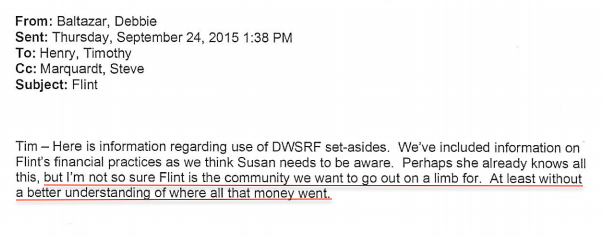This Email Shows the Real Reason Flint's Water Crisis Was Ignored for so Long

By:
On Tuesday, a batch of newly released emails shed some light on the delayed official response to the Flint water crisis. Emails from the Environmental Protection Agency, released by the the U.S. House Committee on Oversight and Government Reform, revealed how the agency hesitated to provide federal resources to Flint due to concerns over the city's financial history.
Both the EPA and the Michigan government have been widely blamed for failing to take action following reports of lead contamination in Flint residents' water due to corrosive water leaching lead from old pipes.
 AP/Paul Sancya - apimages.com
AP/Paul Sancya - apimages.com
An EPA division responsible for allocating funds for water quality services in Flint raised questions about Flint's past use of water utility revenue, when deciding whether to distribute federal money to Flint for water filters in September.
Debbie Baltazar, the water division branch chief for the EPA's Region 5, expressed concerns over allegations that Flint had previously diverted funds from its water utility revenue to its general revenue fund.
 U.S. House Committee on Oversight and Government Reform - house.gov
U.S. House Committee on Oversight and Government Reform - house.gov
"I'm not so sure Flint is the community we want to go out on a limb for," Baltazar wrote. "At least without a better understanding of where all that money went."
What this email means.
The email has stoked controversy over the federal agency's role in the Flint water crisis, because it appears to cast doubt over the city's qualification for federal funds at a time when evidence of lead poisoning among Flint residents was growing. Three days before Baltazar wrote the email, local pediatricians had notified both Flint officials and the EPA about the increased levels of lead in children's blood, Vox reports.
 AP/Todd McInturf - apimages.com
AP/Todd McInturf - apimages.com
How the EPA responded to the email.
But a member of Baltazar's team at the EPA's Region 5, Steve Marquardt, the acting branch chief, says that it's important not to read too far into this email, as the division's role in the Flint water crisis was "very limited."
"We work on funding — we work on grant programs within the agency — and so we were strictly focused on what was eligible under different grant programs," Marquardt told ATTN:. "We are not as tied into all the other things that were going on with the public health issues. We were really the grant side of the shop if that makes sense."
This is part of a larger problem.
In other words, while the language of Baltazar's email might seem dismissive of Flint's water quality problems, this division of the federal agency did not play a central role in the federal response and only dealt with funding requests. Tasked with determining the financial eligibility of Flint for federal money, the division considered the city's reported misuse of water utility revenue to be a red flag.
 /Steven Thomas Kent
/Steven Thomas Kent
But in the end, the email represents just one part of a larger, systemic failure to adequately respond to the Flint water crisis. By January, President Obama announced that Michigan would receive $80 million from the the Drinking Water State Revolving Fund after all, which allowed the state to provide low-cost loans to water utilities for drinking water and wastewater infrastructure construction, The Detroit News reports.
"Our children should not have to be worried about the water that they’re drinking in American cities," Obama said in January. "That’s not something that we should accept."
